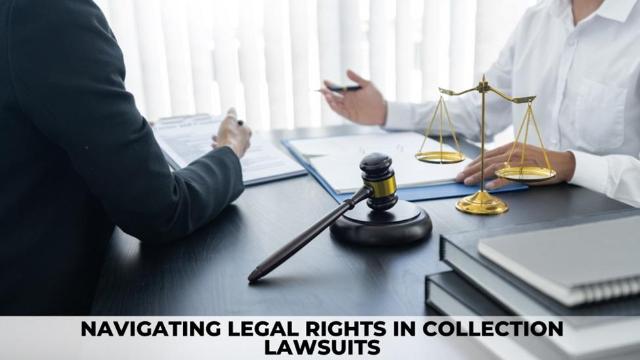Navigating Legal Rights in Collection Lawsuits
Have you ever experienced that heart-stopping moment when you open a legal document alleging you owe a substantial debt? A sense of overwhelming uncertainty? Collection lawsuits can transform an already stressful financial situation into a potential legal nightmare. Every year, thousands of Americans find themselves trapped in the complex web of debt collection litigation, often feeling powerless and uncertain about their rights.
The journey through a collection lawsuit is like navigating a treacherous legal maze. Most individuals lack the knowledge to understand their legal protections, leaving them vulnerable to aggressive collection tactics. Debt collectors leverage this uncertainty, hoping consumers will feel intimidated and comply without question.
Understanding Collection Lawsuits
Collection lawsuits represent critical legal mechanisms through which creditors seek recovery of outstanding financial obligations. These legal proceedings aim to secure court judgments that enable debt collectors to recover money through various enforcement methods, including wage garnishment and asset seizure. Within this complex financial ecosystem, specialized firms like Velocity Investments have emerged as key players, developing sophisticated strategies for debt recovery while maintaining strict regulatory compliance.
The legal landscape of collection lawsuits, particularly with firms like velocity investments, is complex, as modern debt collectors navigate strict regulations to ensure fair practices. Creditors are required to follow protocols that balance recovery efforts with consumer protections. Understanding these legal mechanisms is crucial for consumers. By responding confidently and leveraging your rights, you can address collection lawsuits effectively and without fear, turning the process into an opportunity to resolve disputes on fair terms.
Key Legal Protections for Consumers
Consumers have robust legal protections in collection lawsuits. Federal and state laws provide robust protections against unethical debt collection practices. The Fair Debt Collection Practices Act (FDCPA) establishes clear boundaries for debt collectors' behavior.
Key protections include:
- Protection against harassment or abusive communication tactics
- Right to dispute debt validity within 30 days of initial contact
- Prohibition of threatening or deceptive collection strategies
- Legal recourse for violations of consumer protection statutes
Responding to a Collection Lawsuit
Receiving a collection lawsuit demands immediate and strategic action. Ignoring legal documents can result in default judgments, potentially exposing individuals to more severe financial consequences. Responding promptly demonstrates engagement and can potentially negotiate more favorable terms.
Consumers should carefully review all lawsuit documentation, verifying debt details, collection agency credentials, and statute of limitations. Seeking legal consultation can provide invaluable insights into potential defense strategies and procedural nuances.
Negotiation and Settlement Strategies
Proactive communication often yields more favorable outcomes in collection lawsuits. Debt collectors frequently prefer negotiated settlements over prolonged legal battles. Understanding negotiation techniques can help consumers achieve more manageable resolution terms.
Effective negotiation involves comprehensive documentation, clear communication, and realistic proposed settlement terms. Consumers should aim to negotiate reduced total debt amounts, extended payment plans, or potential debt validation challenges.
Common Legal Challenges in Collection Lawsuits
Debt collectors must meet stringent legal requirements when pursuing collection lawsuits. Common challenges include proving debt ownership, maintaining accurate documentation, and adhering to specific jurisdictional statutes of limitations.
|
Challenges |
Legal Implications |
Potential Consumer Strategy |
|
Debt Validation |
Collectors must prove debt authenticity |
Request comprehensive documentation |
|
Statute of Limitations |
The time-bound legal recovery window |
Challenge lawsuit based on expired limitations |
|
Documentation Accuracy |
Precise record-keeping requirements |
Scrutinize the collection agency's evidence |
The Role of Credit Reporting in Debt Collection
Credit reporting agencies play a pivotal role in the debt collection ecosystem. These agencies maintain comprehensive records of individuals' financial histories, which directly impact debt collection proceedings. The information they compile can significantly influence a consumer's ability to negotiate or challenge collection lawsuits.
Collection lawsuits often leave lasting marks on credit reports, potentially devastating an individual's financial reputation. Negative entries can persist for up to seven years, creating long-term challenges in obtaining credit, securing employment, or accessing financial opportunities. Understanding the intricate relationship between collection lawsuits and credit reporting is crucial for comprehensive financial protection.
Technological Advances in Debt Collection
Modern debt collection has transformed dramatically with technological innovations. Advanced data analytics and sophisticated tracking systems have revolutionized how collection agencies identify and pursue outstanding debts. These technological tools enable more precise and targeted collection strategies.
Digital communication platforms have expanded debt collectors' reach and communication methods. Automated systems can now send multiple communication channels, including emails, text messages, and digital notifications. However, these technological advances must still comply with strict legal regulations protecting consumer rights.
Economic Implications of Collection Lawsuits
Collection lawsuits represent more than individual financial disputes. They reflect broader economic patterns of consumer debt, financial stress, and economic challenges facing many Americans. The frequency and nature of these lawsuits provide crucial insights into economic health and consumer financial stability.
The economic burden of collection lawsuits extends beyond individual plaintiffs and defendants. These legal actions consume judicial resources, impact credit markets, and create ripple effects throughout local and national economic systems. Understanding these broader economic implications can help consumers and policymakers develop more effective financial protection strategies.
Psychological Impact of Debt Collection Litigation
The threat of debt collection lawsuits will cause psychological strain for those involved in the process. The fear of financial judgment is inherently stressful, and the stress can be overwhelming engendering feelings of anxiety, depression, and so forth. Legal proceedings are very challenging for very many consumers in many ways and that is the case of profound mental health challenges.
Psychological resilience becomes a critical factor in navigating collection lawsuits effectively. Building emotional coping mechanisms and accessing appropriate support can help individuals remain grounded and make rational decisions. These difficult times can mean professional counseling and financial advice services can be crucial things to have someone to talk to as well as give advice on how to go forward strategically.
International Comparisons of Debt Collection Practices
Debt collection practices vary significantly across different countries and legal systems. Some nations have more consumer-friendly regulations, while others provide broader powers to debt collectors. These international variations offer valuable perspectives on consumer protection and debt recovery mechanisms.
Comparative analysis reveals diverse approaches to balancing creditor rights and consumer protections. Understanding global practices can inspire policy improvements and more equitable debt collection frameworks. Such international insights can inform more sophisticated and balanced approaches to debt resolution.
Emerging Legal Trends in Consumer Debt Protection
Recent legal developments have increasingly emphasized consumer protection in debt collection processes. Legislative bodies continue to refine regulations that balance creditor recovery rights with consumer financial safety. These emerging trends reflect a growing recognition of the need for more transparent and ethical debt collection practices.
Technological advancements and changing economic landscapes continually reshape legal approaches to debt collection. Machine learning, artificial intelligence, and sophisticated data analysis are transforming how legal frameworks address consumer debt challenges. Staying informed about these emerging trends is crucial for both consumers and financial institutions.
Future of Debt Resolution Mechanisms

Alternative dispute resolution mechanisms are gaining prominence in addressing collection-related conflicts. Mediation, arbitration, and negotiated settlements offer more flexible approaches compared to traditional litigation. These evolving mechanisms prioritize collaborative problem-solving over adversarial legal confrontations.
Technology and innovative financial strategies are reshaping debt resolution paradigms. Digital platforms now facilitate more transparent and efficient communication between creditors and consumers. These technological innovations promise more humane, efficient, and mutually beneficial approaches to resolving financial disputes.
Conclusion
To navigate collection lawsuits you need to know, understand, and adhere to legal protections. By staying informed, you are armed to respond proactively to potential legal challenges and effectively manage such challenges.
Frequently Asked Questions
Can a debt collector sue me on an old debt?
Statutes of limitations vary by state, and debt collectors can sue only within this timeframe. Once their period elapses, it becomes more difficult to take legal action.
What if you ignore a collection lawsuit?
Ignoring a lawsuit typically results in a default judgment, which may lead to wage garnishment or asset seizure.
How can I verify a debt's legitimacy?
Demand a full debt validation letter, and make sure that all documentation clearly and correctly shows each piece of information related to your debt.

